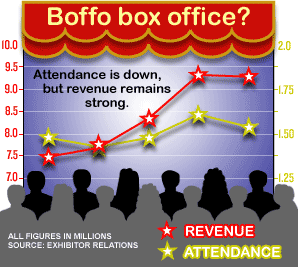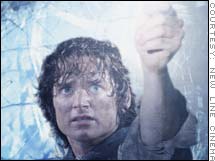NEW YORK (CNN/Money) - The King will not return this year. Movie goers won't get a chance to find Nemo either.
But Hollywood, even in a period of relatively flat U.S. movie attendance is experiencing very healthy economics right now. Every industry should have a slump like the movie industry did in 2003 and may again this year.

Last year was the first year since 1991 that movie studios saw less U.S. box office revenue than the year before, as revenue slipped to $9.28 billion from $9.32 billion a year earlier.
But the continued explosive growth in DVD sales and strong international box office certainly softened any hit from the slight decline in U.S. box office. Also, the comparison was to a record year in 2002.
"Overall I think it was a very good year. It points out how strong 2002 was," said independent stock analyst Dennis McAlpine. "I think last year was a B-plus. This year going in looks like it is a B to B-plus, but typically I'm surprised by something coming out and it ends up as an A to an A-minus."
| 
| |

| 
| 
|

|
 Can winning an Oscar really boost the box office earnings of a movie? CNNfn's Jen Rogers reports. Can winning an Oscar really boost the box office earnings of a movie? CNNfn's Jen Rogers reports.
|
 Play video
Play video
(Real or Windows Media)
|
| 
|

|
|
But there were some big box office disappointments this year as well -- high profile movies such as "Matrix Revolutions" and "Charlie's Angels -- Full Throttle" that opened to bad reviews and disappointing box office numbers that did not cover their costs.
"I think you could say that audiences were mostly underwhelmed by what they saw in theaters," said Paul Dergarabedian, President of box office tracking firm Exhibitor Relations Co. "With a record number of sequels and mixed results for most, there was no mandate by audiences in favor of the re-treads."
The year saw one hugely successful sequel -- "Lord of the Rings: The Return of the King" is poised to break through to become only the second film of all time to post $1 billion in worldwide box office, trailing only 1997's "Titanic." Pixar's and Disney's "Finding Nemo" became the biggest box office animated film of all time, displacing Disney's 1994 hit "The Lion King."
 |
|
| "Lord of the Rings: The Return of the King" is poised to become the second billion-dollar movie in history. |
All told, six films crossed the $200 million mark in U.S. box office and half of those -- Lord of the Rings, Nemo and "Pirates of the Caribbean" crossed the $300 million mark.
This year won't see a Lord of the Rings film for the first time in three years, although it will see a return of Harry Potter to the multiplexes this summer for the third film in that hugely popular series. And Pixar, which has had nothing but home runs at the box office in its brief history, will have films in back-to-back years for the first time when "The Incredibles" comes out in the fall. "Shrek II," the sequel to the 2001 hit, is also due out this summer.
Still there are some signs of trouble below the strong box office numbers in recent years.
First is that much of the gain in revenue can be traced to increases in the average movie ticket prices -- the 2004 average of $6.25 a ticket is up almost 25 percent from 1999 levels. The average number of people attending films in the United States actually has declined in three of the last five years, with the 2003 attendance up only 4 percent from 1999 levels.
The cost of making and marketing movies has continued to rise over this period. Last year saw a record 29 films cross the $100 million mark in terms of U.S. box office. But about two thirds of those films also saw their production and marketing budgets cross the $100 million mark, with two -- "Matrix Reloaded" and "Terminator 3" reaching the $200 million level. It led to a total of eight films that could be described as blockbuster bombs -- not equaling their cost in U.S. box office, despite hitting the nine-figure mark that used to signify a sure hit.
| Related stories
|

|
|
|
|
And it's not just the costs of special effects or television commercials that are rising. Hollywood unions such as writers and actors are pushing in current negotiations for a greater share of the take from the lucrative DVD sales, which has become the real profit generator for most films today.
"If you look at Finding Nemo, they'll probably do $150 million profit on the DVD," said McAlpine. "They (the studios) have gotten away with it for a while, but eventually they'll have to pay the talent."

|